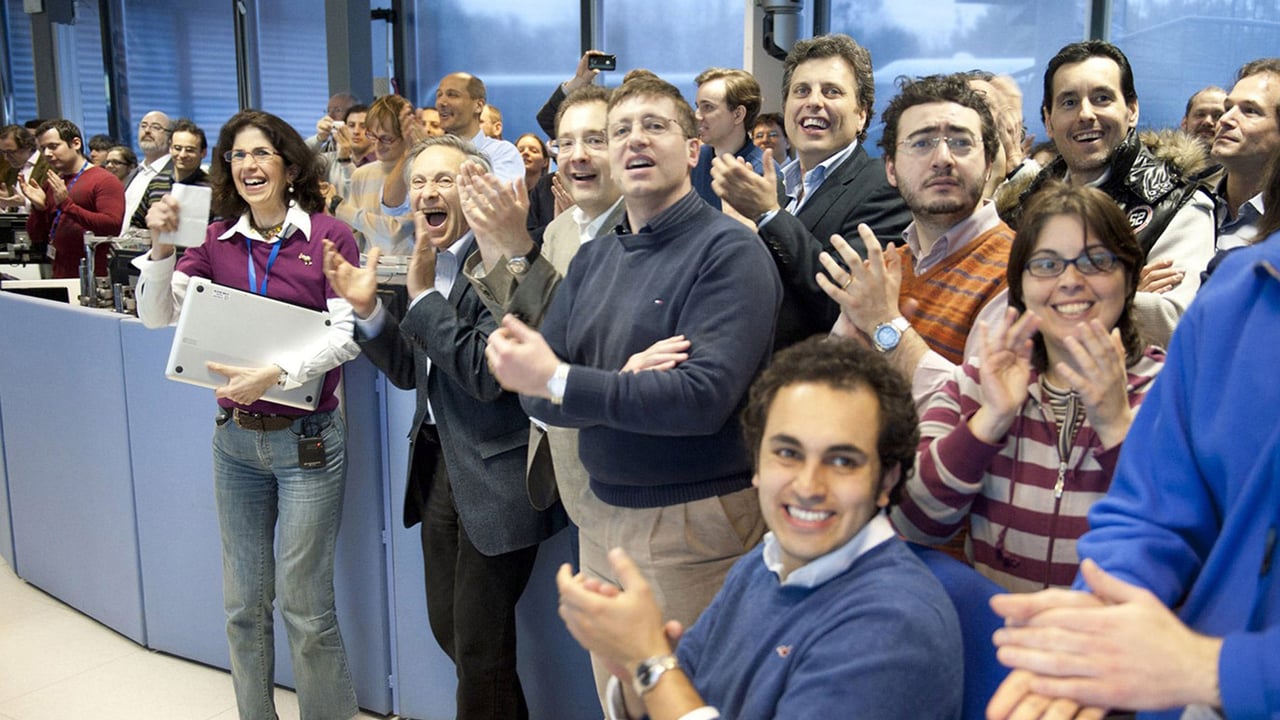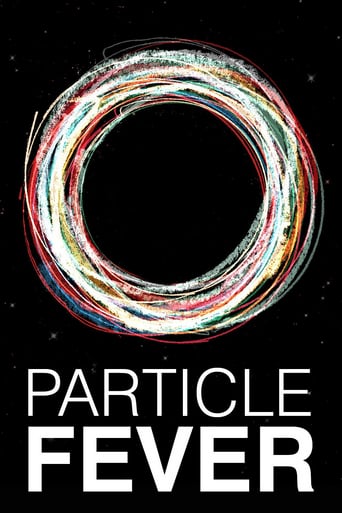

There's a lot of talk about how important what they are doing and people congratulating each other, but they don't really explain much of anything. It's not for a lack of time as they spend too much time on long shots of the countryside or segues with meaningless background chatter. Why did they spend so much time on the kickoff party (complete with rapping physicists) when they could have delved into science a lot more? For a "science" documentary, they missed the audience.If it was meant as a human interest story centered around David Kaplan, that failed too. The scientists they spend less time on come across as smart and likable. Not so much Kaplan who barely tries to explain the importance of CERN but wants funding but doesn't want to write grant applications because people just won't understand. So, after complaining that this research needs to be funded because it is so important, Kaplan immediately talks about how his mentor will only allow three co-researchers on any experiment because he couldn't win a Nobel Prize if there were more. This of course begs the question, if the research is so important, why are you limiting the number of people in hopes that you'll win a prize? If you're doing pure research, shouldn't your personnel decisions be based on doing research, not winning prizes?Kaplan may be a very nice guy who isn't actually like this, but the clips the director shows come across that way. Overall, too little information for a science documentary and too boring for a human interest story.
... View MoreI am a layman and like to think of myself as an intelligent one. So, as I predicted in my headline, I like this movie, even though I have reservations. "Particle Fever" is about a labor intensive physics experiment--that involved many thousands of scientists, lasted from 2007 to 2012 and is actually still on-going. The fact that I watched this film in a format where I could stop and replay gave me an advantage over theater-goers whose reviews say that they could not follow much of the science. I got some things by listening to them twice whereas I might not have otherwise.I like the people aspect of the movie. Monica Dunford is just the cutest, tomboyish experimental (hands-on) physicist. Aside from having the most fabulous name, Fabiola Gianotti is proof that C.P. Snow was exaggerating when he said art is art and science is science and the twain shan't meet. Wrong. As well as being a top physicist, Fabiola was a classical musician and a passionate student of classic literature before she decided to go into science. Savas Dimopoulos is a font of wisdom whether acknowledging that theoretical physics is as much art as it is science or contrasting the act of making a cup of gourmet coffee (if it doesn't come out right you can try again in a few minutes) with physics (if your theory doesn't work out, then you've wasted thirty or forty years of your life).I don't remember who was who, but I enjoyed the humor of several of the scientists, especially the physicist who explained to an audience that there are two answers to the question of why they are conducting this experiment, the one they tell people and real one--not so much because their trying to hide something as they don't think the real reason would make much sense to most people.Then there is the very human moment when the "final" results are being released to a huge audience, and the man for whom the particle is named, Peter Higgs, is brought in and seated, but Monica Dunford points out that he has been given a less choice seat than her colleague's research assistant. At least he is inside. Dimopoulos is left out in the hallway, unable to get a seat at all even though he is a well-known physicist who has spent three decades writing about the Higgs particle.Despite not being a scientist, I have actually been to CERN, more than 25 years ago. It was pleasing to me to see the facilities and surrounding countryside.Although I learned some things about the science from this film, I am afraid I learned enough to understand why some nay-saying physicists do not think CERN's claim to have discovered the Higgs boson is correct and that the particle has not been found. The mass of the found particle surprised the scientists because it was around 125 or 126 GeV instead of the expected 115 or 140, the extremes hoped for by each of two competing theories. A number almost half way in between seems neither to confirm nor disprove either theory. Tienzien Gong has claimed that the reason for this is that they discovered not the Higgs boson but the "vacuum" boson, which an earlier physicist had predicted would have a mass of 125.4 GeV. So Gong thinks CERN's claim of success and the Nobel Prize awarded to Francois Englert and Peter Higgs are premature. But I throw cold water on an otherwise entertaining and informative movie.
... View MoreThe Large Hadron Collider is a gigantic experimental apparatus, conceived in an attempt to discover the fundamental particles that make up the universe. This documentary about it is relatively light on the physics: in concentrates on the hopes of some of the scientists working on it, conveying their innate excitement for their subject rather than the technical details of how and why. But it does convey some of the reasons why this work is (at least theoretically) important: the Higgs Bosun, the previously elusive particle that was target number one for the LHC, is central to modern physical models of the universe; and moreover, determining its mass would help us choose between two broader theories: one is which the universe exists in a state of perfect symmetry, and the other in which it is just one of a huge array of universes, each with their own peculiar properties. And I think the documentary succeeds in inducing its audience to share these concerns. How this relates to the world as we perceive it on a daily basis is very unclear; but the urge to understand is something very fundamental in our humanity, and 'Particle Fever' conveys this well.
... View MoreThis is not an educational film designed for physicists. Those who say the film is light on science should look to its title: "Particle Fever". What does "fever" refer to? Unbridled emotions--from joy to fear--that accompanied scientists' anticipation of an historic event: the operation of the LHC (Large Hadron Collider) in Meyrin, Switzerland.The film explains how the theoretical basis for the CERN experiments dates back decades. Entire scientific careers have focused on theories that might be perfected or destroyed with data from the LHC.Before I started watching this documentary, I decided that I was looking for clarity regarding the physics behind this endeavor. And I was hoping that the film would be engaging. The film is a success on both points. As a layperson, I could never hope to understand the mathematics of theoretic physics or the mechanics of experimental physics, but this film provides the basics for understanding the issues at play and their magnitude. Using a few "actors" to speak to the camera, especially those with overt enthusiasm and those who have invested their lifetimes in this arena of scientific thought, helped me feel their "fever" and understand the stakes.For the most part, this film is presented chronologically, beginning in 2007 as the LHC becomes operational. History and theory are interspersed throughout the film.The most anticipated results of the LHC data pertained to the Higgs boson, a theoretical particle critical to modern particle theory. Much of the drama, at least for those unfamiliar with the data CERN has provided over the years, concerns this particle.This film also shows the relationship of the scientific community with media, which sometimes has the power to excite popular opinion for better or worse. Information presented about a CERN-like project in Texas illustrates that politics play its part, often controlling the purse strings.On the downside, I found some of the universe theory to be anthropocentric and even anthropomorphic. Also, when Nima A. says it is "incredible" that the laws of nature are understandable via math, I understand what he means, but I wonder if there are other "maths" unavailable to us that could explain those laws of nature that are imperceivable by man. We can know but a small part of the multiverse. This is something astronomers have already accepted.
... View More